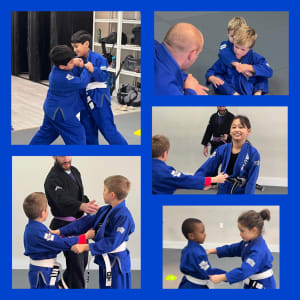
Brazilian Jiu-Jitsu (BJJ) is more than a martial art—it’s a tool for personal growth, discipline, and resilience. For children, it offers a unique opportunity to develop physical literacy, emotional intelligence, and social skills. But how we teach BJJ to kids matters just as much as what we teach.
Traditional methods often rely on rote drilling and rigid instruction. While these can be effective for adults, they don’t align with how children naturally learn. Enter the ecological approach and games-based learning—two powerful, research-backed methods that transform the way kids engage with Jiu-Jitsu. In this post, we’ll explore what these approaches are, why they work, and how they create a fun, effective, and empowering learning environment for young grapplers.
Understanding the Ecological Approach
The ecological approach to learning is rooted in the idea that skills emerge through interaction with the environment, not through isolated repetition. In BJJ, this means kids learn techniques and concepts by solving movement problems in dynamic, game-like scenarios—rather than memorizing steps.
Key Principles of the Ecological Approach:
- Perception-action coupling: Kids learn by perceiving opportunities for action (e.g., space, pressure, timing) and responding in real time.
- Representative learning design: Training mimics real sparring situations, helping kids develop adaptable skills.
- Constraints-led learning: Coaches shape behavior by adjusting task, environmental, or individual constraints (e.g., limiting grips, changing starting positions).
This approach respects the natural way children learn—through exploration, trial and error, and meaningful engagement.
Why Games-Based Learning Works for Kids
Children are wired to learn through play. Games-based learning taps into this instinct, making Jiu-Jitsu fun, engaging, and developmentally appropriate.
Benefits of Games-Based Learning:
- Intrinsic motivation: Kids are more likely to participate enthusiastically when learning feels like play.
- Creativity and problem-solving: Games encourage experimentation and strategic thinking.
- Social development: Team-based and partner games foster cooperation, communication, and empathy.
- Retention and transfer: Skills learned in game contexts are more likely to stick and transfer to live sparring.
Games also reduce performance anxiety and create a positive emotional climate—essential for long-term engagement and growth.
How the Ecological Approach and Games Work Together
When combined, the ecological approach and games-based learning create a powerful synergy. Coaches design games that simulate real grappling scenarios, allowing kids to discover techniques organically. Instead of being told what to do, they learn why and how through experience.
Example: Teaching Guard Retention
- Traditional method: Coach demonstrates a hip escape and asks kids to repeat it in lines.
- Ecological/games-based method: Coach sets up a game where one child tries to pass the guard while the other defends using any movement they choose. Constraints (e.g., no grips, limited space) guide behavior.
In the game, kids learn to hip escape, frame, and recover guard—not because they were told to, but because the situation demanded it.
Developmental Benefits Beyond the Mat
Teaching Jiu-Jitsu through games and ecological principles doesn’t just build better grapplers—it builds better humans.
- Physical Literacy
Kids develop coordination, balance, agility, and spatial awareness. These foundational skills support lifelong physical activity and injury prevention.
- Emotional Regulation
Games teach kids to manage frustration, cope with loss, and celebrate success. They learn to stay calm under pressure and bounce back from setbacks.
- Cognitive Growth
Problem-solving, decision-making, and strategic thinking are baked into every game. Kids learn to analyze situations, adapt quickly, and think ahead.
- Social Skills
Partner games require communication, respect, and teamwork. Kids learn to listen, collaborate, and build positive relationships.
Creating a Safe and Inclusive Learning Environment
The ecological approach naturally supports inclusivity. Because games are adaptable, coaches can tailor them to different skill levels, learning styles, and personalities.
Inclusive Strategies:
- Modify constraints to support beginners or challenge advanced students.
- Use cooperative games to build trust and reduce competition anxiety.
- Celebrate effort and creativity rather than just outcomes.
This approach ensures every child feels valued, capable, and excited to learn.
The Long-Term Impact
Kids who learn Jiu-Jitsu through ecological and games-based methods don’t just become better athletes—they become lifelong learners. They develop a love for movement, a growth mindset, and the confidence to face challenges head-on.
What We See Over Time:
- Higher retention rates: Kids stay engaged and excited to train.
- Faster skill acquisition: Learning through play accelerates understanding.
- Stronger emotional resilience: Kids learn to navigate wins and losses with grace.
- Deeper social bonds: The mat becomes a place of friendship, trust, and belonging.
Conclusion: Let Kids Play, Learn, and Grow
Brazilian Jiu-Jitsu is a gift we give to children—a gift of strength, confidence, and self-discovery. But how we deliver that gift matters. By embracing the ecological approach and games-based learning, we honor the way kids naturally grow. We create environments where they feel safe, challenged, and inspired. So let them play. Let them explore. Let them fall and get back up. Because on the mats, through games and guided discovery, they’re not just learning Jiu-Jitsu—they’re learning how to thrive.
